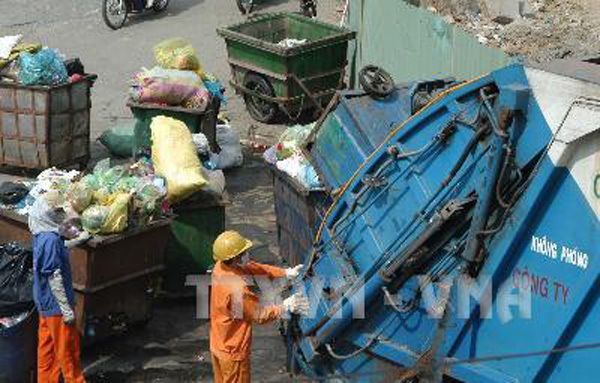 |
| Workers in HCM City transport garbage from waste transfer stations. VNA/VNS Photo Thanh Phan |
Because many districts face a shortage of land, the city's pavements and even parks are used to collect solid waste before it is transported to landfills, leading to pollution and the loss of urban beauty.
On Hung Vuong Street in District 10’s Ward 1, for instance, many vehicles filled with garbage park there because there are no waste transfer stations. Water from these vehicles leaks onto the streets.
In another case, a waste transfer station at Dien Bien Phu Street in Binh Thanh District’s Ward 25 is not covered, and the garbage emits odors, affecting residents living nearby.
Several other waste transfer stations have degraded floors and fluids leaking from garbage, leading to unhygienic conditions.
Huynh Minh Nhut, director of the HCM City Urban Environment Company Limited, said the amount of solid waste in the city had increased by 6 per cent to 9 per cent each year.
This had put pressure on management authorities and companies in charge of collection, transport and treatment of waste.
The vehicles and technologies used to transport and treat waste before transfer to landfills were outdated.
Nguyen Toan Thang, head of the Department of Natural Resources and Environment, said the city would build 40 waste transfer centres in 19 districts by 2025.
The centres will have cameras and software to observe the amount of collected waste and the quality of the environment. They will have closed waste compaction technology and an environmental management system.
Of the nine stations, three in District 12 and Thu Duc are now under construction.
The department is waiting for investment policies from the city People’s Committee to build the other stations in districts Binh Tan, 9, Cu Chi and Nha Be.
The People’s Committee has instructed the department to consider setting up solid waste transfer stations at industrial parks and export processing zones. These will help reduce the number of waste gathering areas in the city.
In addition, the city will enlarge existing waste transfer stations, thereby reducing the number of waste gathering spots on streets in the city.
Nhut said that his company was upgrading two stations used by many garbage vehicles by 2025. At these stations, garbage would be classified for reuse and recycling.
According to the department, nearly 9,200 tonnes of solid waste are discharged each day in HCM City. The figure is expected to increase to 13,000 tonnes per day by 2025. VNS

HCM City needs VND29 trillion for solid waste treatment
HCMC will need nearly VND29 trillion in the next five years to implement a solid waste treatment scheme, which is aimed at enhancing the management, classification, collection, and recycling of solid waste in the city.

HCM City draws up master plan on solid waste
HCM City is drawing up a master plan on solid waste management and treatment for the next five years, aiming to have 100% of its domestic solid waste to be collected and treated and at least 80% of solid household waste classified at source.